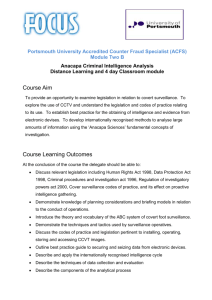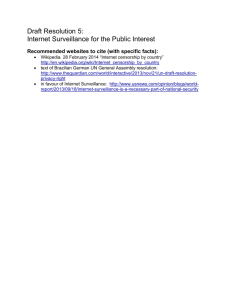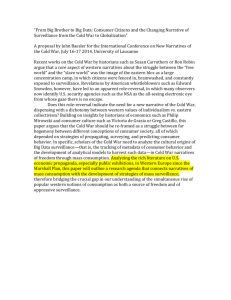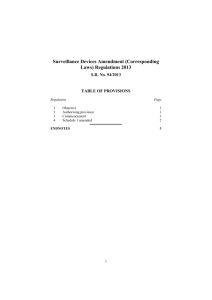Fife Council Policy & Procedure for the
advertisement
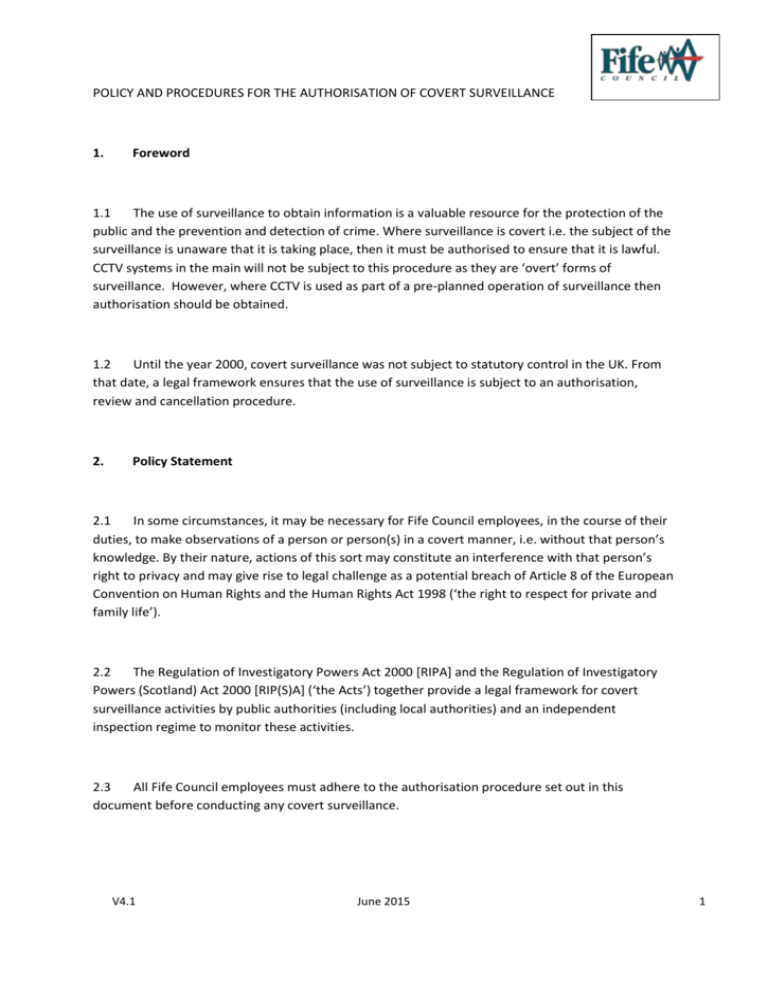
POLICY AND PROCEDURES FOR THE AUTHORISATION OF COVERT SURVEILLANCE 1. Foreword 1.1 The use of surveillance to obtain information is a valuable resource for the protection of the public and the prevention and detection of crime. Where surveillance is covert i.e. the subject of the surveillance is unaware that it is taking place, then it must be authorised to ensure that it is lawful. CCTV systems in the main will not be subject to this procedure as they are ‘overt’ forms of surveillance. However, where CCTV is used as part of a pre-planned operation of surveillance then authorisation should be obtained. 1.2 Until the year 2000, covert surveillance was not subject to statutory control in the UK. From that date, a legal framework ensures that the use of surveillance is subject to an authorisation, review and cancellation procedure. 2. Policy Statement 2.1 In some circumstances, it may be necessary for Fife Council employees, in the course of their duties, to make observations of a person or person(s) in a covert manner, i.e. without that person’s knowledge. By their nature, actions of this sort may constitute an interference with that person’s right to privacy and may give rise to legal challenge as a potential breach of Article 8 of the European Convention on Human Rights and the Human Rights Act 1998 (‘the right to respect for private and family life’). 2.2 The Regulation of Investigatory Powers Act 2000 [RIPA] and the Regulation of Investigatory Powers (Scotland) Act 2000 [RIP(S)A] (‘the Acts’) together provide a legal framework for covert surveillance activities by public authorities (including local authorities) and an independent inspection regime to monitor these activities. 2.3 All Fife Council employees must adhere to the authorisation procedure set out in this document before conducting any covert surveillance. V4.1 June 2015 1 2.4 Employees of Fife Council will not carry out intrusive surveillance within the meaning of the Regulation of Investigatory Powers (Scotland) Act 2000. This is surveillance of anything taking place on residential premises or in a private vehicle that involves the presence of an individual or device on the premises or in the vehicle or is carried out by means of a surveillance device capable of providing information of the same quality and detail as might be expected to be obtained from a device actually present on the premises or in the vehicle. 3. Objective 3.1 The objective of this procedure is to ensure that all use of directed surveillance by Fife Council employees is effective and carried out in accordance with the law. This document should be read in conjunction with the Regulation of Investigatory Powers (Scotland) Act 2000 any relevant guidance and in particular the Scottish Government’s Code of Practice on Covert Surveillance and Property Interference ( Published Nov 2014). 3.2 Definitions 3.2.1 Directed Surveillance - see para 4.1 below. 3.2.2 Covert surveillance means surveillance that is carried out in a manner calculated to ensure that the persons subject to the surveillance are unaware that it is taking place. 3.2.3 Authorising Officer is the person who is entitled to give an authorisation for directed surveillance in accordance with section 8 (3) of the Regulation of Investigatory Powers (Scotland) Act 2000 (see para 6.1 below). 3.2.4 Private information includes information about a person relating to his/her private or family life. 3.2.5 Residential premises means any premises occupied or used, however temporarily, for residential purposes or otherwise as living accommodation. V4.1 June 2015 2 3.2.6 Private vehicle means any vehicle that is used primarily for the private purpose of the person who owns it or of a person otherwise having the right to use it. This does not include a person whose right to use a vehicle derives only from his/her having paid, or undertaken to pay, for the use of the vehicle and its driver for a particular journey. A vehicle includes any vessel, aircraft or hovercraft. 3.2.7 Intrusive Surveillance – see para 2.4 above 4. Scope of the Procedure 4.1 This procedure applies in all cases where ‘directed surveillance’ is being planned or carried out. The Scottish Government’s Code of Practice states that surveillance is directed surveillance if the following are all true – i) it is covert but not intrusive surveillance; ii) it is conducted for the purpose of a specific operation; iii) it is likely to result in obtaining private information about a person; iv) it is conducted otherwise than by way of an immediate response to events. 4.2 The procedure does not apply to:- · ad-hoc covert observations that do not involve the systematic surveillance of specific person(s); · observations that are not carried out covertly; or · unplanned observations made as an immediate response to events. 4.3 In cases of doubt as to whether the procedure applies, the Council’s Head of Legal Services should be consulted for advice.. 5. Principles of Surveillance V4.1 June 2015 3 5.1 In planning and carrying out covert surveillance, Fife Council employees shall comply with the following principles. 5.2 Lawful purposes 5.2.1 Directed surveillance shall only be carried out where necessary to achieve one or more of the permitted purposes (as defined in the Acts), namely:- § for the purpose of preventing or detecting crime or the prevention of disorder; § in the interests of public safety; § for the purpose of protecting public health; 5.2.2 Employees carrying out surveillance shall have regard to the lawful purpose that is being served and conduct themselves having regard to the law, this document and any relevant Guidance or Code of Practice. 5.3 Confidential material 5.3.1 Applications where a risk of acquiring confidential material has been identified shall always require the approval of the Chief Executive or, in his or her absence, an Executive Director. 5.3.2 Confidential material includes:- · client); matters subject to legal privilege (for example between professional legal advisor and · confidential personal information (for example relating to a person’s physical or mental health); or · confidential journalistic material. V4.1 June 2015 4 6. The Authorisation Process 6.1 Applications for authority to conduct directed surveillance must be authorised by an Authorising Officer at the level of Investigation Manager or Assistant Head of Service as prescribed by the Regulation of Investigatory Powers (Prescription of Offices, etc and Specification of Public Authorities) (Scotland) Order 2010. Assistant Head of Service includes any post however titled that reports directly to a Head of Service. Investigation Manager is an officer who has responsibility for overseeing the work of investigators but who does not normally carry out such work. 6.2 Authorising Officers within the meaning of this document must avoid authorising their own activities and where, by necessity, an Investigation Manager has to be directly involved in the specified investigation he or she must obtain an authorisation from another Authorising Officer. 6.3 Authorisations must be in writing. However, in urgent cases an Authorising Officer may approve applications orally. Where this is done, the authorisation will only last for 72 hours and must be renewed if deemed necessary. Prior to an Authorising Officer approving a request, contact must be made with the Information Request Team based within the Communities Directorate who will provide a unique reference number. 6.4 The Information Request Team are responsible for maintaining a central register of all surveillance applications, providing Services with guidance and updating the standard templates used in connection with this procedure. The team are also responsible for providing statistical information to the Council and the Office of the Surveillance Commissioner. 6.5 All applications for authorisation to carry out directed surveillance will be made on form FC/AUTH/DS. The applicant in all cases should complete this. In urgent cases, an oral authorisation may be given by the Authorising Officer. A statement that the Authorising Officer has expressly granted the authorisation must be recorded on the form or, if a form is not available, in the applicant’s notebook or diary. This should be done by the person to whom the authorising officer spoke (normally the applicant) but must later be endorsed by the Authorising Officer. It is essential that there is clarity as to what is being authorised (i.e. who, what, where, when and how). The Authorising Officer should state exactly what is being authorised against which subjects, property or location. When completing the application form detailed explanations need to be given as to why directed surveillance is necessary, why the surveillance requested is proportionate and the nature of the surveillance being authorised. A review date also requires to be set and all cases must be reviewed no later than 28 days from the date of authorisation. V4.1 June 2015 5 6.6 All applications for directed surveillance renewals will be made on form FC/REN/DS. The applicant in all cases must complete this where the surveillance requires to continue beyond the previously authorised period (including previous renewals). 6.7 Where authorisation ceases to be either necessary or appropriate, the Authorising Officer must cancel an authorisation using form FC/CAN/DS. 6.8 Forms, the Code of practice and further guidance is available from the Council’s Head of Legal Services. 6.9 that:- Any person giving an authorisation for the use of directed surveillance must be satisfied · account has been taken of the likely degree of intrusion into the privacy of persons other than those directly implicated in the operation or investigation (‘collateral intrusion’). Measures must be taken, wherever practicable, to avoid unnecessary intrusion into the lives of those affected by collateral intrusion; · the authorisation is necessary; · the authorised surveillance is proportionate. 6.10 Necessity Surveillance operations shall only be undertaken where there is no reasonable and effective alternative way of achieving the desired objective(s). Authorisations should therefore make clear why covert surveillance is necessary with reference to other methods which have been considered and why there were assessed as being inadequate. 6.11 Effectiveness Surveillance operations shall be undertaken only by suitably trained or experienced employees, or under their direct supervision. V4.1 June 2015 6 6.12 Proportionality The use of surveillance shall not be excessive, i.e. it shall be in proportion to the significance of the matter being investigated. It is essential that an authorisation demonstrates how an Authorising Officer has reached the conclusion that the activity is proportionate to what it seeks to achieve; including an explanation of the reasons why the method, tactic or technique proposed is not disproportionate. Proportionality is not only about balancing the effectiveness of covert methods over overt methods but of explaining why the particular covert method is the least intrusive. 6.13 Authorisation All directed surveillance shall be authorised in accordance with this document. Applicants should apply within their own line management structure unless other arrangements have been agreed or it is unreasonable or impractical in the circumstances to do so. 7. Time Periods – Authorisations 7.1 Oral authorisations expire after 72 hours. If required, they can be renewed for a further period of 3 months if renewed in writing. 7.2 Written authorisations expire 3 months after the day from which they took effect unless renewed or cancelled. 8. Time Periods – Renewals 8.1 If at any time before an authorisation would expire (including oral authorisations) the Authorising Officer considers it necessary for the authorisation to continue for the purpose for which it was given, it may be renewed in writing for a further period of 3 months beginning with the day on which the previous authorisation ceases to have effect. Applications using form FC/REN/DS should be made, not more than, 7 days before the authorisation is due to expire. V4.1 June 2015 7 8.2 Any person entitled to authorise may renew authorisations. They may be renewed more than once, provided they continue to meet the criteria for authorisation. 9. Review 9.1 The Authorising Officer shall review all authorisations or renewals at intervals of not more than 28 days. Details of the review and the decision reached should be notified to the Information Request Team, in the Communities Directorate, immediately after they have been made using form FC/REV/DS. 10. Cancellation 10.1 An Authorising Officer must cancel an authorisation if he/she is satisfied that the directed surveillance no longer satisfies the criteria for authorisation. It is a statutory requirement that authorisations are cancelled as soon as they are no longer required. Form FC/CAN/DS should be used for cancellations. 10.2 Each Service or section within a Service must maintain a record of all applications for authorisation (including refusals), renewals, reviews and cancellations using the monitoring sheet form FC/MS/RIPSA . The Authorising Officer must update the monitoring sheet in respect of all applications considered by them. 11. Security and Retention of Documents 11.1 Documents created in connection with directed surveillance are highly confidential and shall be treated as such. Services shall make proper arrangements for their retention, security and destruction, in accordance with the requirements of the Data Protection Act 1998 and the Council’s file retention policy. 11.2 The Information Request Team within the Communities Directorate will maintain the Central Register of Authorisations. Authorising Officers must notify the Information Request Team of the grant, renewal or cancellation of any authorisations and the name of the Applicant Officer within one working day to ensure the accuracy of the Central Register. V4.1 June 2015 8 11.3 The Authorising Officer shall retain the original Authorisation and Renewal forms until cancelled. On cancellation, the original Application, Renewal and Cancellation forms shall be forwarded to the Information Request Team with the Authorising Officer retaining a copy. 11.4 The Authorising Officer shall retain the copy forms for one year after cancellation. The Information Request Team will retain the original forms for five years after cancellation. In both cases, these will then be destroyed unless at that time they are required for a specific legal purpose. These purposes will be determined by the Head of Legal Services or a Surveillance Commissioner. 12. Oversight 12.1 The Office of Surveillance Commissioners (OSC) provides independent oversight of the use of the powers contained within the Regulation of Investigatory Powers (Scotland) Act 2000. This oversight includes inspection visits by Inspectors appointed by the OSC. 13. Public Access and Complaints 13.1 The Regulation of Investigatory Powers Act 2000 (the ‘UK Act) establishes an independent Tribunal. This has full powers to investigate and decide any cases within its jurisdiction. 13.2 A copy of this policy will be available for any member of the public who requests to see it. Document Reviewed and Updated June 2015 Author : Head of Legal Services, Fife Council Forms referred to 1) Application for Authorisation to Carry Out Directed Surveillance – FC/AUTH/DS V4.1 June 2015 9 2) Application for Renewal of Directed Surveillance Authority – FC/REN/DS 3) Application for Review of Directed Surveillance Authority – FC/REV/DS 4) Cancellation of Directed Surveillance – FC/CAN/DS 5) Service Monitoring Sheet – FC/MS/RIPSA V4.1 June 2015 10

